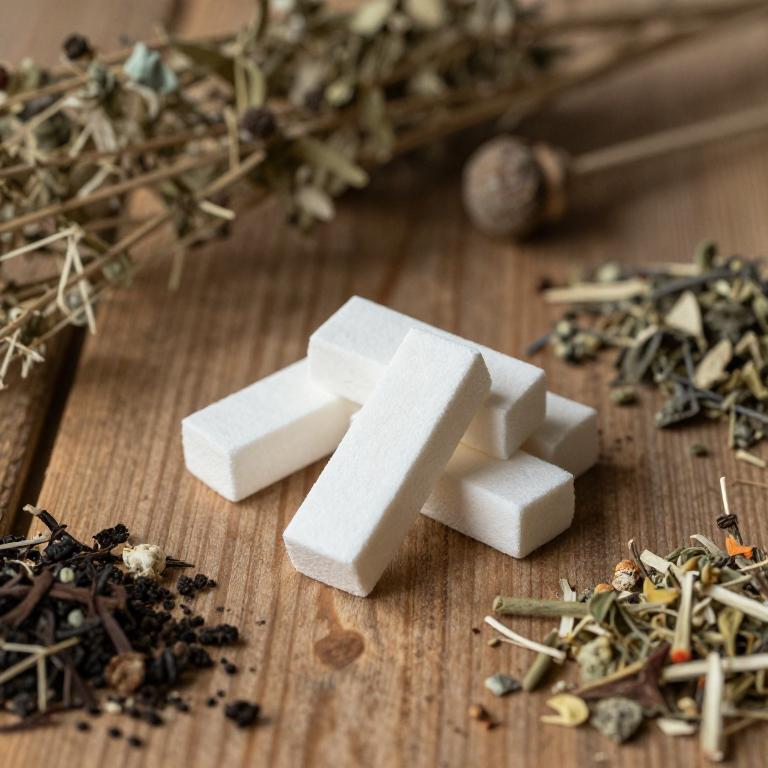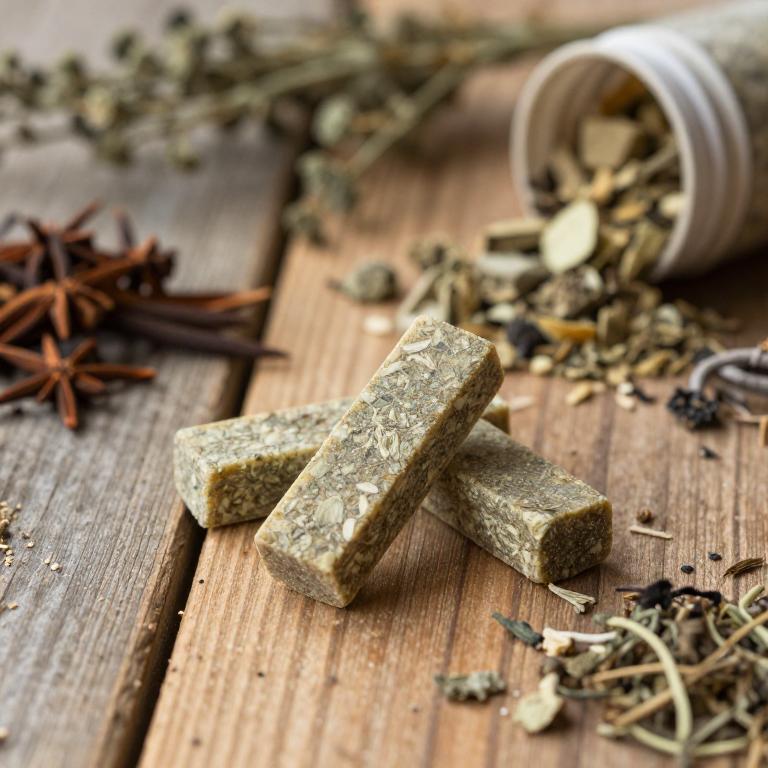10 Best Herbal Lozenges For Colds

Herbal lozenges are a popular natural remedy for缓解 cold symptoms, often containing ingredients like echinacea, ginger, licorice root, and sage, which are believed to have soothing and immune-boosting properties.
These lozenges work by coating the throat, reducing irritation, and providing temporary relief from soreness and coughing. They are typically preferred by individuals seeking alternatives to over-the-counter medications with potential side effects. Many herbal lozenges are available in various flavors, making them more pleasant to use regularly.
While they may not cure a cold, they can help ease discomfort and support the body's natural healing process.
Table of Contents
- 1. Ginger (Zingiber officinale)
- 2. Salvia (Salvia officinalis)
- 3. Echinacea (Echinacea purpurea)
- 4. Peppermint (Mentha piperita)
- 5. Fennel (Foeniculum vulgare)
- 6. Licorice (Glycyrrhiza glabra)
- 7. Thyme (Thymus vulgaris)
- 8. Camellia (Camellia sinensis)
- 9. Stinging nettle (Urtica dioica)
- 10. Ceylon cinnamon (Cinnamomum zeylanicum)
1. Ginger (Zingiber officinale)

Zingiber officinale, commonly known as ginger, is a popular herbal remedy often used in the form of lozenges to alleviate symptoms of colds.
These lozenges are made from dried and ground ginger root, which contains active compounds like gingerol and shogaol that have anti-inflammatory and antioxidant properties. They are believed to help reduce throat irritation, soothe coughing, and ease nasal congestion associated with colds. Ginger lozenges are generally considered safe for most adults and may be a natural alternative to over-the-counter cold medications.
However, individuals with gastrointestinal issues or those taking blood-thinning medications should consult a healthcare provider before use.
2. Salvia (Salvia officinalis)

Salvia officinalis, commonly known as sage, is a traditional herb that has been used for centuries to support respiratory health.
Sage herbal lozenges are formulated to soothe sore throats and reduce coughing, making them a popular remedy for cold symptoms. These lozenges often contain essential oils and antioxidants that may help fight off infections and ease inflammation in the throat. The warming effect of sage can provide relief from the discomfort associated with colds and flu.
While they are not a cure for colds, sage lozenges can be a natural and effective complementary treatment when used as part of a holistic approach to cold care.
3. Echinacea (Echinacea purpurea)

Echinacea purpurea herbal lozenges are commonly used as a natural remedy to help alleviate symptoms of the common cold.
These lozenges contain extracts from the purple coneflower, a plant traditionally used in Native American medicine for its immune-boosting properties. Studies suggest that echinacea may help reduce the duration and severity of cold symptoms by supporting the body's immune response. The lozenges are typically made with herbal ingredients and are often preferred by individuals seeking alternatives to over-the-counter medications.
However, while some research supports their effectiveness, results can vary, and it is advisable to consult a healthcare professional before use, especially for those with allergies or chronic health conditions.
4. Peppermint (Mentha piperita)

Mentha piperita, commonly known as peppermint, is a popular herbal ingredient used in lozenges to alleviate cold symptoms.
These lozenges are designed to provide relief from sore throats, coughs, and nasal congestion by leveraging the cooling and soothing properties of peppermint oil. The menthol in peppermint helps to ease respiratory discomfort and reduce the perception of throat irritation. Peppermint lozenges are often favored for their pleasant flavor and natural composition, making them a preferred choice for those seeking non-pharmaceutical relief.
They are generally safe for most adults and can be used as a complementary remedy alongside other cold treatments.
5. Fennel (Foeniculum vulgare)

Foeniculum vulgare, commonly known as fennel, is a herb often used in the form of lozenges to alleviate symptoms of colds.
These lozenges are made from the dried seeds of the fennel plant and are valued for their mild anise-like flavor and aromatic properties. They are typically used to soothe sore throats, reduce coughing, and ease congestion due to their expectorant and antispasmodic effects. Fennel lozenges are considered safe for most adults and children, though they should be used with caution during pregnancy or in cases of known allergies.
Regular use of fennel lozenges may help provide natural relief from mild cold symptoms while supporting overall respiratory comfort.
6. Licorice (Glycyrrhiza glabra)

Glycyrrhiza glabra, commonly known as licorice root, has been traditionally used in herbal medicine for its soothing and anti-inflammatory properties.
Glycyrrhiza glabra herbal lozenges are often formulated to alleviate symptoms of colds, such as sore throat, coughing, and nasal congestion. The active compounds in licorice root, including glycyrrhizin and flavonoids, help reduce inflammation and strengthen the mucous membranes in the respiratory tract. These lozenges are typically safe for short-term use but may cause side effects like hypertension if consumed in large amounts over prolonged periods.
As a complementary remedy, glycyrrhiza glabra lozenges can provide relief and support the body's natural defenses during a cold.
7. Thyme (Thymus vulgaris)

Thymus vulgaris, commonly known as thyme, is a popular herbal remedy used in the form of lozenges to alleviate symptoms of colds and respiratory infections.
These lozenges are made from the dried leaves and flowers of the thyme plant, which contains potent compounds like thymol and carvacrol, known for their antimicrobial and anti-inflammatory properties. Thyme lozenges are often recommended for their ability to soothe sore throats, reduce coughing, and ease congestion, making them a natural alternative to over-the-counter cold medications. They are generally safe for most adults and children when used as directed, though individuals with allergies to plants in the Lamiaceae family should exercise caution.
Regular use of thyme lozenges can support the body's natural defenses and provide relief during the early stages of a cold.
8. Camellia (Camellia sinensis)

Camellia sinensis herbal lozenges are made from the leaves of the Camellia sinensis plant, which is the source of green and black tea.
These lozenges are often used to alleviate symptoms of colds due to their soothing and antimicrobial properties. They can help reduce throat irritation, ease coughing, and provide a refreshing sensation in the mouth. The active compounds in Camellia sinensis, such as catechins and polyphenols, may support the immune system and have mild antiviral effects.
While they are not a cure for colds, they can be a natural and gentle remedy to ease discomfort during a cold.
9. Stinging nettle (Urtica dioica)

Urtica dioica, commonly known as stinging nettle, is a herb that has been traditionally used for its potential health benefits, including its soothing properties for sore throats and respiratory discomfort.
Urtica dioica herbal lozenges are formulated to provide natural relief from cold symptoms such as coughing, sore throat, and nasal congestion by leveraging the plant's anti-inflammatory and antioxidant properties. These lozenges are often made from dried stinging nettle leaves and may be combined with other herbal ingredients to enhance their effectiveness. They are suitable for adults and children over a certain age and are typically free from common allergens, making them a safe option for many individuals.
While they may not cure a cold, they can help alleviate symptoms and support the body's natural recovery process.
10. Ceylon cinnamon (Cinnamomum zeylanicum)

Cinnamomum zeylanicum, commonly known as cinnamon, is often used in herbal lozenges to alleviate symptoms of colds due to its warming and antimicrobial properties.
These lozenges help soothe sore throats and reduce coughing by providing a mild numbing effect on the throat tissues. The essential oils in cinnamon, such as cinnamaldehyde, have been shown to possess anti-inflammatory and antioxidant benefits that may support the body's natural defenses against viral infections. When used as part of a holistic approach to cold care, cinnamon lozenges can offer gentle relief without the side effects associated with over-the-counter medications.
However, individuals with allergies to cinnamon or those taking certain medications should consult a healthcare professional before using these herbal lozenges.